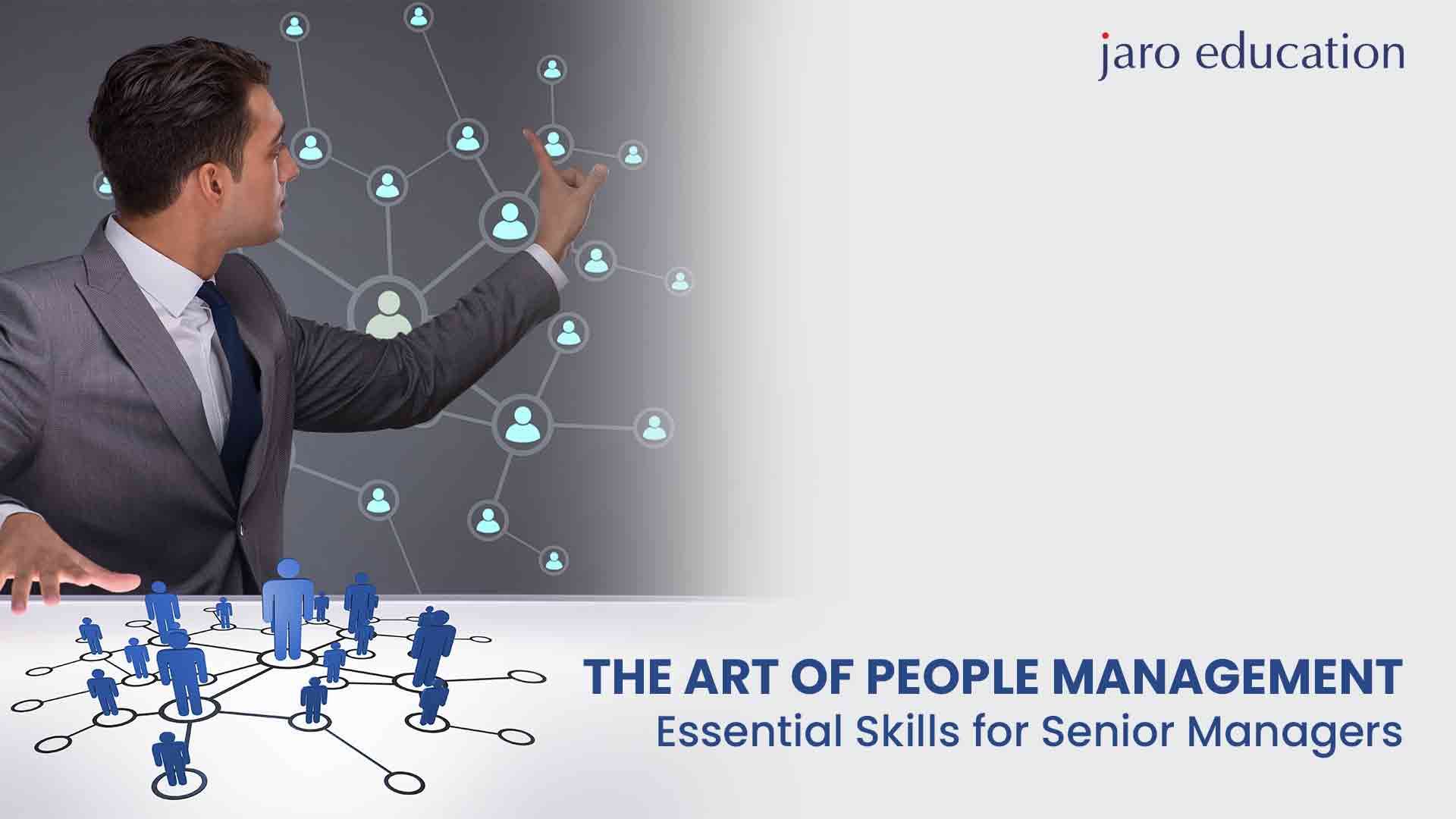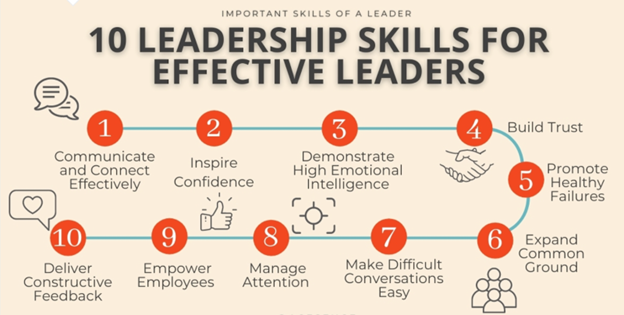The Art of People Management: Essential Skills for Senior Managers
Table of Contents

- jaro education
- 13, February 2024
- 11:00 am
People are the backbone of any successful organization. Understanding what is people management and developing expertise in it is essential for leaders seeking to build high-performing teams. People management involves the ability to bring out the best in your team members through effective communication, coaching, motivation and support. It requires both ‘hard’ strategic skills and ‘soft’ skills like empathy and emotional intelligence. For senior managers with the responsibility to execute business strategy, strong people management capabilities are indispensable.
This blog will provide an overview of six fundamental people management skills – communication, developing talent, leading change, emotional intelligence, team building, and strategic decision-making.
6 Effective Skills for Senior Managers to Successfully Manage People
Managing people can be tricky at multiple levels. Here are the six skills that can help senior managers efficiently manage the teams working for them.

*blog.acesence.com
1. Communication Skills
Strong communication skills are essential people management skills for senior managers. Effective communication enables leaders to:
- Clearly relay organizational strategy and goals to provide direction. Regular all-hands meetings with two-way dialogue build employee engagement.
- Deliver constructive performance feedback focused on improvement. Tailoring messages and using empathy builds trust while developing talent.
- Coach employees through thoughtful questioning and active listening without judgment. Sharing relevant experiences supports growth.
- Resolve conflicts by listening to both sides, finding common ground and guiding resolution. Addressing issues with courageous candor maintains trust.
- Communicate complex ideas simply to ensure understanding across diverse audiences like executives, cross-functional teams and frontline staff.
- Listen actively to concerns and feedback to foster openness. Ask clarifying questions to fully grasp issues.
- Tailor communication style and messaging to resonate with different groups and situations. Adapt to what will be most impactful.
- Provide transparency around decisions, strategy and company performance to build engagement. Candor with teams is crucial.
- Explain the rationale behind change initiatives to create alignment on the “why” before discussing execution.
Thus, communication skills allow managers to translate strategy into executable actions. Mastering multi-faceted communication is foundational to great people management skills.
2. Developing Talent
Strong people management skills enable senior managers to continuously develop talent. Key aspects of developing team members include:
- Regularly assessing strengths and areas for growth through performance reviews, feedback and observations. This provides insights into the tailored coaching needed.
- Providing stretch assignments that build skills like having an engineer lead a process improvement project to develop leadership abilities.
- Coaching through asking thoughtful questions, actively listening, and sharing guidance without judgment. Coaching works best when interest in development is shown.
- Creating individual development plans that enable growth based on strengths, interests and aspirations. This focuses on training.
- Identifying high potential future leaders within the organization and providing them tailored accelerated development.
- Conducting training needs analysis across the team to identify group-wide gaps, and arranging targeted people management courses accordingly.
- Encouraging peer coaching and mentoring within the team to develop skills. Set up buddies for knowledge sharing.
- Providing adequate time for learning amidst daily work along with opportunities to apply skills. This cements development.
- Celebrating successes like completion of training programs to positively reinforce continuous development.
- Maintaining a pipeline of developed talent to fill critical roles provides bench strength.
As a result, outstanding people management skills involve dedication to developing talent. With robust processes for assessment, training, coaching, and succession planning, managers enable team members to maximize their potential.
3. Leading Change
Guiding teams through change is an essential people management skill. Ways managers can lead change effectively include:
- Explaining the business case and reasons for the change to provide transparency. This builds an understanding of the rationale behind shifts.
- Actively soliciting input and concerns from the team to surface worries early before they escalate. To do so, you must listen empathetically.
- Involving the team in solution design or implementation planning to boost commitment. Remember, participation increases buy-in to the change.
- Setting clear goals, timelines and regular milestones to reduce uncertainty. Define new roles, responsibilities and processes needed.
- Acknowledging and appreciating efforts made by teams and individuals to adopt the change. Recognize small wins.
- Providing transitional coaching and training to equip teams with the skills needed to work in new ways and arrange appropriate people management courses.
- Modeling desired mindsets and behaviors through own actions. Walking the talk reinforces the culture shift expected.
- Addressing resistance constructively by understanding root causes. Reframe narratives positively.
- Maintaining two-way communication to offer clarity and reinforce messaging. Ensure teams internalize the change.
- Collecting regular feedback to identify gaps or barriers to change, and taking corrective actions. Measure progress.
So, change leadership requires planning, empathy, communication and commitment to sustainably transforming teams. Leading through uncertainty with care epitomizes great people management skills.
4. Emotional Intelligence
Emotionally intelligent managers adeptly recognize and manage emotions in themselves and others. Key aspects include:
- Self-awareness of own emotional responses and triggers. Ability to regulate reactions even when frustrated or stressed.
- Reading others’ nonverbal cues and body language to discern unspoken feelings and reactions in the room.
- Regulating immediate impulse to lash out even when provoked. Responding calmly and rationally.
- Demonstrating authentic care for employees’ well-being. Checking in if someone seems stressed.
- Balancing drive for results with empathy and compassion. Understanding when a caring approach is needed.
- Giving positive reinforcement and acknowledgement of achievements. Celebrating wins builds morale.
- Courageously tackling issues transparently yet sensitively. Handling conflict constructively.
- Role modeling resilience and positivity when facing challenges. Remaining calm amidst uncertainty.
- Building trust across the team by maintaining confidentiality and integrity. Walking the talk.
- Facilitating open dialogue and listening actively to foster diversity of thought. Welcoming dissenting views.
Emotional intelligence enables managers to unlock potential by role modeling care, building trust and addressing issues sensitively. Mastering these “soft skills” is as crucial as technical expertise for success. Emotional intelligence is the heart of what is people management.
5. Team Building
Strong team-building skills allow managers to develop high-performing teams. Effective approaches include:
- Assembling complementary skills and working styles. Seeking diversity of strengths across technical, creative, analytical, and interpersonal abilities.
- Facilitating collaboration across functions and departments. Fostering connections between specialists to solve complex issues.
- Resolving conflicts quickly and constructively before they escalate. Building trust and reminding all of the shared purpose.
- Defining clear team goals, roles and responsibilities. Maintaining accountability while allowing autonomy in work.
- Recognizing collective wins reinforces teamwork, not just individual contributions. Public appreciations build energy.
- Organizing team-building activities to foster camaraderie and bonding. Encouraging informal interactions.
- Modeling organizational values like excellence, integrity and respect through own behavior. Setting the tone from the top.
- Ensuring the team has adequate resources and tools needed to execute on goals and strategy. Removing roadblocks.
- Developing future team leaders by providing growth opportunities. Building bench strength.
- Communicating transparently to ensure clarity on priorities, challenges and changes. Candor builds trust.
Hence team building skills enable managers to get maximal synergistic output from cross-functional groups. Building cohesive, empowered teams is the essence of what is people management.
6. Strategic Decision-Making
Senior managers must make complex strategic decisions that shape their organization’s future. Excellent strategic decision-making involves:
- Thoroughly analyzing internal and external data to identify risks, opportunities and trends. Anticipating future needs.
- Weighing costs, benefits and risks of alternatives. Considering unintended consequences. Avoiding judgment biases.
- Involving cross-functional team members to provide diverse inputs and challenge assumptions. Reduces blind spots.
- Ensuring alignment with company vision, values and long-term strategic goals. Laddering up decisions.
- Explaining the rationale behind decisions to offer transparency. Clarity on trade-offs boosts understanding.
- Continuously tracking performance data and competitive landscape. Adjusting strategies over time as needed.
- Making tough calls despite uncertainty, complexity or lack of consensus. Sometimes right decisions are unpopular initially.
- Adapting decisions as new information emerges while avoiding flip-flopping. Balancing conviction with openness to change course.
- Acknowledging failures quickly and learning lessons to improve future decision-making. Reflecting on wins and losses.
- Communicating decisions effectively across the organization for alignment. Cascading down specifics to enable execution.
Strategic decision-making requires blending hard data with experience and intuition to chart an organization’s course. Excellent judgment under uncertainty sustains competitive advantage.
Conclusion
Being an effective people manager requires dedication across a diverse skill set, including communication, strategic thinking, and emotional intelligence. While technical expertise is important, growth in these “soft” capabilities separates average managers from inspirational leaders. People management, at its core, is about bringing out the best in your team through understanding, motivation and support. For organizations to execute strategy and sustain competitive advantage, senior managers must continuously strengthen their people management abilities.
So, are you aspiring to take your leadership skills to the next level? Look no further than the Post Graduate Certificate in Senior Management Programme by IIM Tiruchirappalli. This transformative course condenses decades of IIM’s expertise in people management, change leadership, strategic thinking and team building into an intensive 1-year curriculum. Led by world-renowned faculty, you will gain cutting-edge insights to maximize your impact. With a strong focus on self-discovery and practical application, the Senior Management course will equip you with the mindsets and capabilities to accelerate your career growth. Unlock your leadership potential today at IIM Tiruchirappalli!









